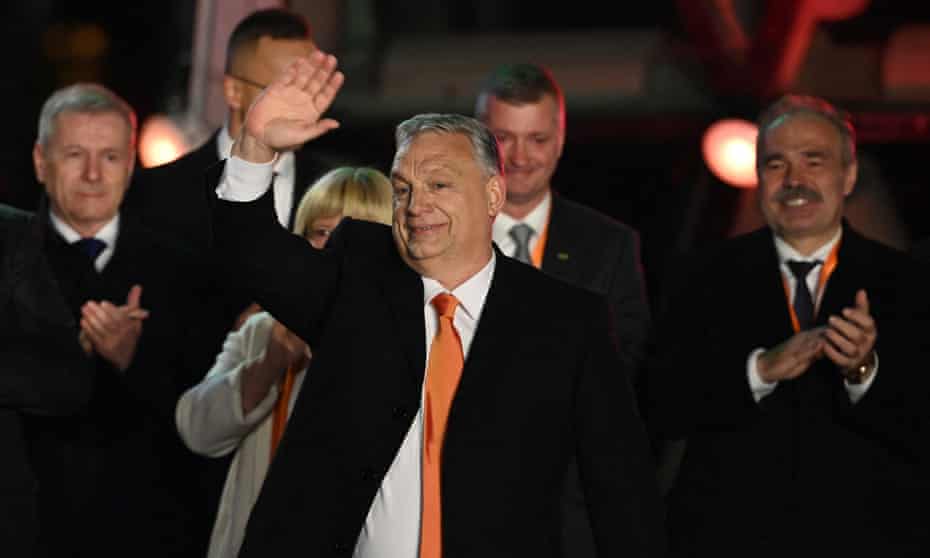Victory of Putin ally Orbán in Hungary may trigger freeze on EU funding
MEPs say billions in payments could be withheld from far-right leader due to democratic backsliding

Vladimir Putin has congratulated Hungary’s strongman leader, Viktor Orbán, on his decisive election victory, amid signs that European Union authorities will launch a sanctions process against Budapest that is intended to safeguard EU funds at risk from democratic-backsliding member states.
Two members of the European parliament said they expected the European Commission to launch the “rule of law conditionality mechanism” against Hungary, a legal process that could ultimately switch off billions in EU payments to Budapest.
EU countries that have government-controlled courts and captured state institutions can be deprived of EU funds, but the law has never been tested.
At the European parliament in Brussels on Monday, MEPs expressed shock at Orbán’s victory speech, where he hit out at “opponents”, including a characteristic dig at “Brussels bureaucrats”, but also Ukraine’s president, Volodymyr Zelenskiy. The swaggering speech came just hours after the western world reacted in horror to the atrocities at Bucha and other towns near Kyiv.
On Monday, Putin offered his congratulations to Orbán, who is a long-term Kremlin ally, despite Hungary’s support for EU sanctions against Russia. “Despite the difficult international situation, the further development of a bilateral partnership fully accords to the interests of the peoples of Russia and Hungary,” a Kremlin statement said.
Britain’s Nigel Farage, France’s Marine Le Pen and Italy’s Matteo Salvini were also quick to congratulate Orbán. “When the people vote, the people win,” tweeted Le Pen, the French far-right leader, who is vying to unseat Emmanuel Macron as president in imminent elections.
EU leaders were conspicuously silent on a day when independent election observers at the Organization for Security and Cooperation in Europe (OSCE) reported that the Hungarian vote was “marred by the absence of a level playing field”.
Czech foreign minister Jan Lipavskỷ, a key regional ally, said he was “not satisfied with the election’s result in Hungary”, but had to “seek partners” in his country’s interest. “Hungary must choose its side, and whether they belong to the EU and Nato,” he said.
German MEP Daniel Freund, a persistent Orbán critic, said he expected the commission to trigger the rule of law mechanism within days. “My understanding is that the triggering of the conditionality against Hungary could happen, possibly as early as this week,” he told reporters. “The financial pressure will start to be felt rather quickly if the commission would move,” he said adding, even if the EU process took months to unfold, it could be harder for Budapest to borrow money.
Petri Sarvamaa, a centre-right Finnish MEP, said, based on his understanding, the commission was going to trigger the process within days, but added that Hungary posed far deeper questions. Europe could be approaching a historic moment, he said. “We are facing existential issues. These are totalitarian authoritarian regimes vis-a-vis the democratic world and Orbán seems to be willing to be part of that [first] camp.”
“We appeased Viktor Orbán … and we, the union, appeased Vladimir Putin. And if we continue on this path.. We will find ourselves obsolete.”
László Andor, a Hungarian former European commissioner, said that he expected the commission’s president, Ursula von der Leyen, “to hesitate” on next steps. “Dealing with Hungary is not the strongest performance of the Von der Leyen commission,” he said. “There has been a huge amount of prevarication.”
Andor, who is affiliated to the opposition Socialist party, added: “For Hungary it is obviously terrible to remain in the grip of Orbán so severely, and the political landscape also shows this massive division between Budapest and the rest of the country.”
Orbán’s stunning victory was likely to increase his confidence against the EU, analysts predicted.
“He will be very self-confident in his policies,” said Daniel Hegedüs, a visiting fellow at the German Marshall Fund, who also expects Orbán’s government to “simply steal policy ideas from the radical right” after it emerged that the far-right Our Homeland party was set to enter parliament for the first time.
“Potentially there would be a very pragmatic balancing game on the side of the European Commission: on the one hand not provoking Hungary into blocking EU decision making in the council, but on the other hand … not being too soft and too accommodating. It would be fatal if there would be only accommodation.”
Orbán will also have to mend fences with allies in central Europe, who have criticised his refusal to aid Ukraine with weapons or to allow arms to travel through Hungary. A meeting of four central European defence ministers was cancelled last week after the Czech defence minister accused Hungary of valuing “cheap Russian oil” over Ukrainian blood.
But there were signs of a rapprochement between Warsaw and Budapest, when Poland’s prime minister, Mateusz Morawiecki, who favours tough sanctions on Russia, avoided criticising Hungary for its opposition to an oil embargo. “It’s Germany that is the main roadblock on sanctions,” he said. “Hungary is for the sanctions,” he claimed.
While Poland and Hungary are sharply opposed over their approach to Russia, the nationalist governments share common ground in their fight against Brussels over the rule of law. “Relations will be a bit colder than they used to be,” Hegedüs said. “But they also have areas of joint interest and I think they will very closely co-operate in those areas.”
Dutch liberal lawmaker Sophie in ‘t Veld described Orbán’s reelection as “a disaster” for Hungarians. “It also means that he will sit on the European Council [of EU leaders] – a very powerful EU governance body that shapes laws for all Europeans – as someone who has been elected through rigged elections,” she said, as the OSCE issued its critical report, highlighting “biased” news coverage and the blurred line between party and state. “The magnitude of this problem has to sink in,” the MEP said.

No comments:
Post a Comment